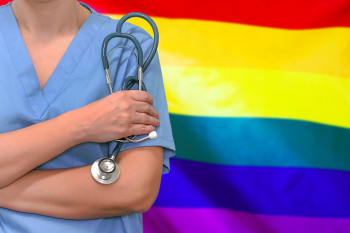Navigating Cancer: Unique Challenges Faced by the LGBTQIA+

Cancer: It’s a word we all fear. A cancer diagnosis is a daunting journey for any patient, but for LGBTQIA+ individuals, the path can include additional hurdles. From navigating assumptions about sexual orientation and gender identity to encountering medical discrimination, the unique challenges faced by LGBTQIA+ cancer patients make a scary situation even more difficult. With awareness and sensitivity, though, we can start to make the personal and societal changes needed to lift these burdens and give LGBTQIA+ cancer patients the support they need.
Assumptions and Anxiety about Coming Out
A cancer diagnosis means the immediate surrounding by a slew of healthcare providers. Many of whom may assume their new patient is heterosexual and cisgender. For patients who are not openly LGBTQIA+ or who fear judgment or discrimination, this assumption can cause significant discomfort and anxiety. Coming out about one’s sexual orientation or gender identity in a medical setting can be intimidating. It can take energy and focus away from the urgent matter of cancer treatment.
Discrimination in Medical Settings
Unfortunately, discrimination against LGBTQIA+ individuals in healthcare settings is not uncommon. From insensitive comments to outright refusal of care, LGBTQIA+ cancer patients may face hostility or neglect from their healthcare providers. This discrimination can have profound effects on patients’ well-being and health outcomes. There can be distrust of the medical system and even avoidance of necessary care.
Disparities in Survivorship
Studies show that LGBTQIA+ individuals may experience disparities in cancer survivorship compared to their heterosexual and cisgender counterparts. Attributes of these include various factors. Examples include lack of access to affirming healthcare, higher rates of tobacco and alcohol use, and increased chronic stress. This is due to discrimination and harassment faced in their daily lives. Addressing these disparities requires targeted interventions to improve access to quality healthcare and support services for LGBTQIA+ cancer survivors.
Supporting LGBTQIA+ Cancer Patients
As allies and advocates, we can all find ways to support LGBTQIA+ individuals facing cancer.
- Create Safe Spaces: Medical professionals and administrative personnel can ensure healthcare settings are inclusive and welcoming to LGBTQIA+ patients by adopting inclusive language, providing training for staff on LGBTQIA+ cultural competency, and displaying visible symbols of support, such as rainbow flags or LGBTQIA+ affirming signage.
- Listen and Validate: If you know or work with an LGBTQIA+ cancer patient, take the time to listen to their concerns and experiences without judgment. Validate their identities and experiences, and offer support in navigating the challenges they may encounter.
- Advocate for Equality: Advocate for policies and practices that promote equality and inclusion in healthcare settings. These include nondiscrimination policies, equal access to care, and cultural competency training for healthcare providers.
- Raise Awareness: As you learn more, share your awareness about the unique challenges faced by LGBTQIA+ cancer patients and the importance of addressing health disparities within this marginalized community. By increasing visibility and understanding, we can work to build a more equitable and supportive healthcare system for all.
WORKPLACE SOLUTIONS is a group of dedicated professionals who provide assistance and resources to individuals and families to create a satisfying and meaningful life. We’re counselors, attorneys, financial professionals, and experienced specialists in a wide variety of fields. Because life’s challenges and opportunities show up in a range of different areas, we assist in a number of different ways.

